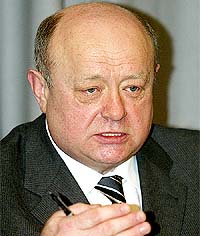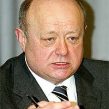
RUSSIA RECLAIMING CENTRAL ASIA AS SPHERE OF INFLUENCE
Publication: Eurasia Daily Monitor Volume: 4 Issue: 50
By:

Russia’s Prime Minister Mikhail Fradkov paid an official visit to Tashkent on March 7, describing Uzbekistan as Russia’s closest partner in Central Asia. This marked the first occasion that a Russian prime minister has visited Tashkent since 1999. Talks centered on President Islam Karimov’s ideas to further strengthen the rapidly growing cooperation ties between Russia and Uzbekistan. This includes comprehensive cooperation in culture and education, trade and the economy, and security, as well as within existing multilateral organizations. Karimov made the most of the visit, telling Fradkov: “Your visit to Uzbekistan is seen as fresh evidence of how dynamic — and I would say fast — relations are developing between Uzbekistan and Russia. Dynamic development in our relations at multilateral as well as bilateral levels is obvious in a variety of areas in which we cooperate. We also use your visit to take a critical look at the state of affairs in various areas of cooperation. Not just a critical look, but we must also find solutions to urgent problems and agree [on] cooperation priorities” (Uzbek TV Second Channel Yoshlar, March 7).
Fradkov described his two-day visit to Tashkent as marking a “serious step toward a deeper and broader political dialogue between the two countries.” After meeting with his Uzbek counterpart, Shavkat Mirziyayev, the Russian prime minister explained the underlying motives in his diplomacy: “We want greater cooperation. We are strategic partners and allies, and we are capable of resolving all tasks we set ourselves” (Regnum.ru, March 7).
Problems were also addressed such as the issue of Tashkent’s concerns that Gazprom was failing to meet its contractual commitments and was too slow to implement energy projects in Uzbekistan. Following the meeting, Andrei Sharonov, Russia’s first deputy economic development and trade minister, who was part of the Russian delegation, listened to these complaints but said that Russian firms were having problems taking their earnings out of Uzbekistan, often waiting up to three months for conversion and transfer of money (Itar-Tass, March 7).
Fradkov pointed to the key areas for expanding bilateral cooperation: “Russia and Uzbekistan have built friendly and partnership relations. We view Uzbekistan as our strategic partner. Russia intends to develop cooperation with Uzbekistan in the fields of fuel and energy, peaceful exploration of space, migration, as well as military-technical and humanitarian cooperation,” Fradkov said. He expressed confidence that any outstanding issues of concern would be resolved and the relationship between Moscow and Tashkent is set to grow. Fradkov and Mirziyayev concentrated their security talks on the prospects for greater synergy in tackling the threats of international terrorism, drug trafficking, and organized crime. Although they mentioned the multilateral bodies through which this could be pursued, such as the Collective Security Treaty Organization and the Shanghai Cooperation Organization, it appeared that Moscow is primarily pushing the bilateral approach, classifying Uzbekistan not only as a “strategic partner” but designating it as Russia’s strongest ally in the region.
Russia and Uzbekistan agreed to set up an aircraft repair joint venture, UzRosAvia. Boris Aleshin, head of Rosprom Russia’s Federal Agency for Industry, praised this agreement, saying, “This is the first enterprise of this sort in the aircraft industry in the CIS. [Commonwealth of Independent States] The firm is established for the repair of Mi-8 and Mi-24 helicopters, primarily in the interests of the armed forces of Uzbekistan and other states.” Russian enterprises will have a total share of no less than 51% in UzRosAvia’s capital. It brings together Oboronprom (defense industry), Rosoboroneksport (Russian state arms export agency), the Uzbek Chkalov aircraft-building association in Tashkent, and an aircraft repair plant in Chirchiq, Uzbekistan. The Uzbek government will fund the project, and UzRosAvia will be based at the Chirchiq factory (Itar-Tass, March 7).
The factory will carry out repairs to Mi-8 and Mi-24 helicopters. Interestingly, Fradkov denied that the real justification for the creation of the joint aviation venture is to prepare the way for a future Russian airbase in Uzbekistan. He said this had not been raised at the talks. “I have not had such discussions, certainly not with reference to any particular location,” he added (RIA-Novosti, March 7).
The general improvement in bilateral relations between Russia and Uzbekistan now looks to reach new levels. But for what purpose? Russia long objected to the U.S. military and security influence in Central Asia since its deployment there after 9/11. Russia’s relations remain very strong with other countries in the region, including Kazakhstan. However, by designating Uzbekistan as Russia’s main partner in the region, Moscow hopes to dissuade Tashkent’s neighbors from becoming more involved in Western security assistance packages. This is more than a part of the bilateral rapprochement, which has witnessed Uzbekistan’s re-entry to the CSTO. In other words, Moscow is using Uzbekistan to counter U.S. influence in Central Asia. Uzbekistan’s neighbors will scrutinize carefully the benefits that this relationship brings to the Uzbek military and security agencies, before following Tashkent’s lead.




